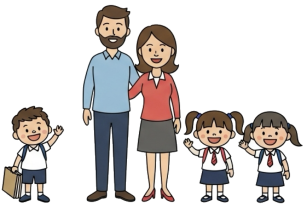
Question More, Action Knowledge.
Remember, at QMAK, we don’t just teach; we empower. We don’t just inform; we inspire. We don’t just question; we act. Become a Gold Member, and let’s unlock your child’s full potential, one question at a time.
A victim mindset can develop early in childhood when children begin to perceive challenges as threats rather than opportunities, believe they have little control over circumstances, or habitually focus on unfairness.
While it’s natural for children to occasionally feel powerless or treated unfairly, when these perceptions become their default way of responding to difficulties, they can limit resilience, happiness, and healthy development.
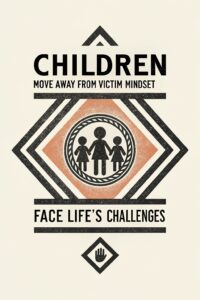
This guide provides research-based strategies and engaging activities designed for children around age 7 to help them develop more empowered, resilient approaches to life’s challenges.
Through these approaches, children can learn to recognize their agency, develop constructive responses to difficulties, and build emotional strength that will serve them throughout life.
Helping children develop alternatives to victim thinking:
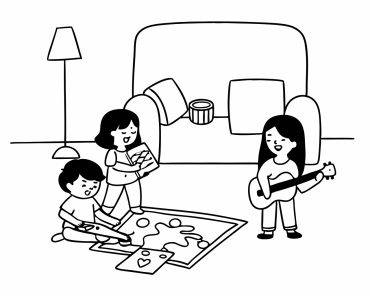
Developing emotional acceptance and resilience provides children with the foundation to face challenges with strength and flexibility rather than feeling overwhelmed or victimized by them.

Episode: Copycat
Facing a bird’s death while playing Copycat, Bluey learns from Bandit how to accept sadness and build resilience, understanding difficult things happen but they’ll be okay.
How parents respond to a child’s emotions, mistakes, and challenges profoundly shapes their self-concept and approach to difficulties. A supportive, empathetic parenting style fosters confidence and emotional regulation rather than vulnerability to victim thinking.

Episode: Burger Shop
Bandit’s playful-yet-difficult customer role in “Burger Shop” challenges Bluey. His supportive approach encourages her to manage frustration and adapt, building confidence, not victimhood.
Healthy peer relationships provide children with opportunities to develop social skills, receive validation, and experience belonging—all of which counter tendencies toward feeling victimized or isolated.

Episode: Café
Bluey and Winnie play together, developing social skills like negotiation and teamwork. Their shared game provides validation and a sense of belonging.
The ability to understand others’ perspectives, thoughts, and feelings helps children navigate social situations effectively and reduces misinterpretations that can lead to feelings of victimization.

Episode: Pass the Parcel
Pat’s new Pass the Parcel rule challenges kids like Bingo. They gradually grasp his reasoning and winners’ feelings, developing Theory of Mind beyond their own perspective.
Mindfulness and impulse control help children respond thoughtfully rather than reactively to challenges, giving them greater agency in their emotions and behaviors.

Episode: Puppets
The Heeler family uses puppets, showing how easy it is to act impulsively (like Unicorse). It highlights practicing mindfulness and thoughtful responses over reactivity.
Each strategy section includes detailed activities, implementation guides, and tips for success.
When choosing activities, consider:
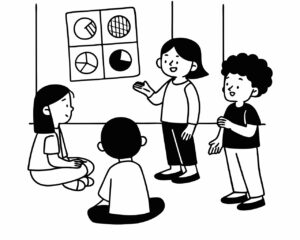
Remember that helping children move beyond victim thinking is a gradual process that involves:
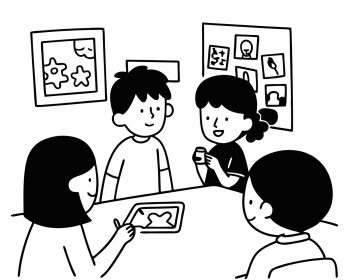
Select any of the five strategy sections above to find detailed activities and implementation guides.
Each section provides practical tools and approaches that you can start using today to help your child develop a more empowered and resilient mindset.
Remember: The goal isn’t to deny the reality of challenges or difficulties in your child’s life, but to help them develop the emotional tools to respond with resilience rather than helplessness.
With patience, consistency, and the right approaches, children can learn to face life’s inevitable challenges with confidence in their ability to handle them constructively.
Small hands reaching out
Trying to make sense of the world
When the rain comes down hard
And everything feels so unfair
You say, “It’s always me”
Head down, tears fall like rain
But there’s more to your story
Than the battles you face
You’ve got fire inside
Just waiting to blaze
You’re stronger than yesterday
Every fall, every scrape
Teaches something brave
Look up, not down
Find your ground
The world’s not against you
It’s just asking you to grow
To be stronger than yesterday
I see that look in your eyes
When friends don’t understand
When things don’t go as planned
But you don’t have to carry
This weight all on your own
There’s power in knowing
What you can change and what to let go
‘Cause there’s more to your story
Than the battles you face
You’ve got light in your eyes
Just waiting to shine
You’re stronger than yesterday
Every fall, every scrape
Teaches something brave
Look up, not down
Find your ground
The world’s not against you
It’s just asking you to grow
To be stronger than yesterday
It’s not about never falling down
It’s about rising every time
Finding the courage deep inside
To face the world with open eyes
To breathe and say
“I can try again”
Some days will test you
Some days will break you
But they won’t define you
Unless you let them
You’re stronger than yesterday
Every fall, every scrape
Teaches something brave
Look up, not down
Find your ground
The world’s not against you
It’s just asking you to grow

Remember, at QMAK, we don’t just teach; we empower. We don’t just inform; we inspire. We don’t just question; we act. Become a Gold Member, and let’s unlock your child’s full potential, one question at a time.